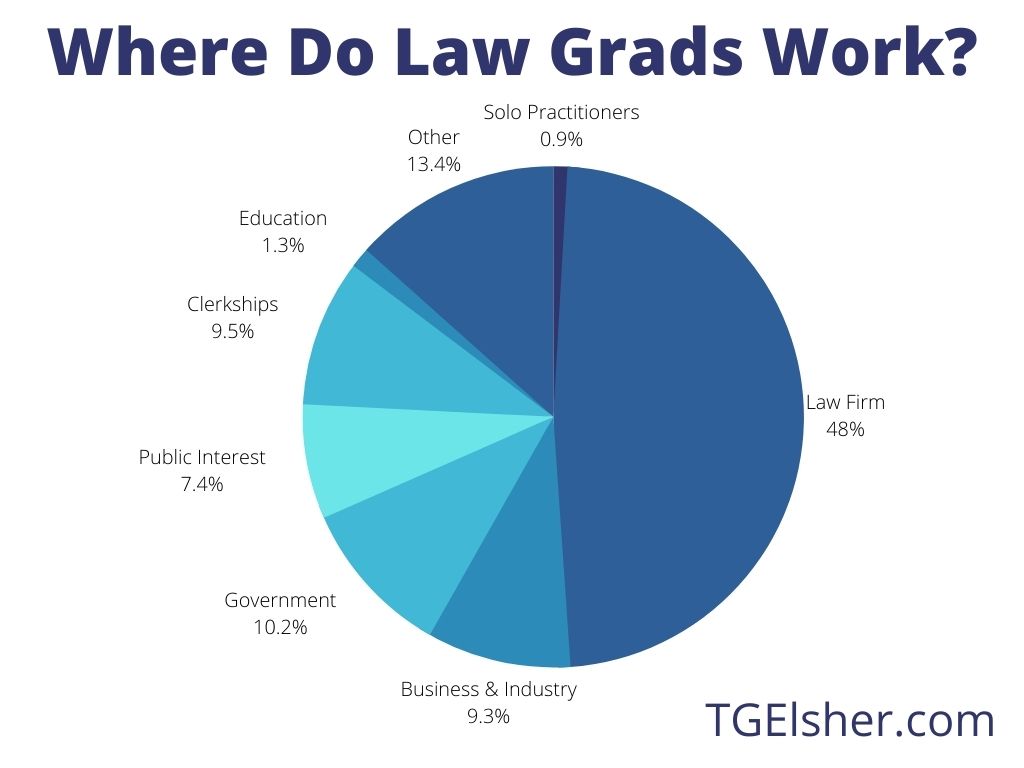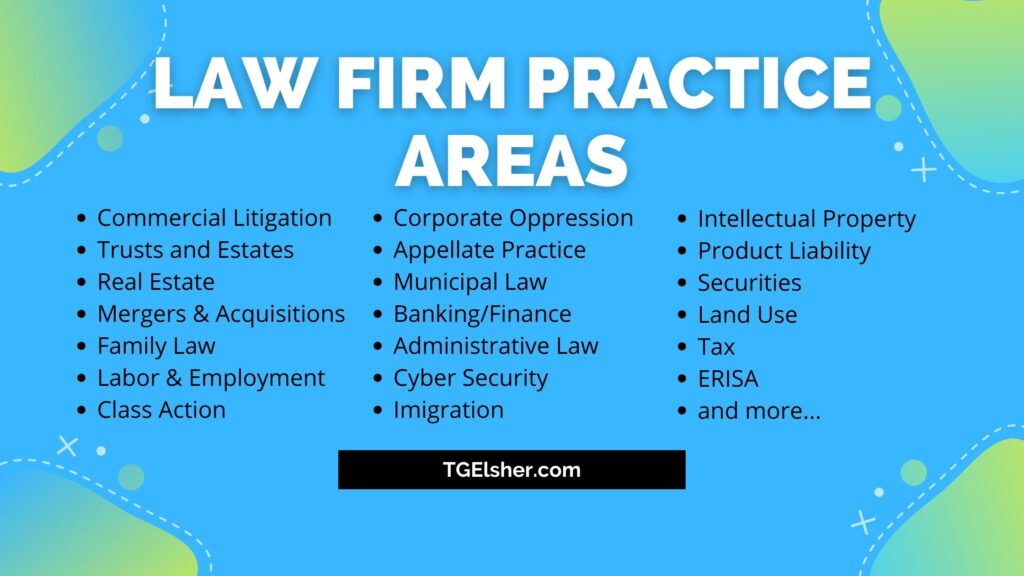Choosing a legal career, practice area, or focus can feel overwhelming, especially when it seems like your peers have it all figured out.
The truth is, most of them don’t.
Many law students feel unsure about their post-graduate path, and even those who think they know what they want to do may end up changing their interests or starting in another field.
Because you are about to read the complete guide, let’s get some myths out of the way first. That way you can start with a blank slate to assess your options. Then we will answer the question, “what does choosing a legal career involve.”
Myths About Choosing a Legal Career
Myth 1: You need to figure out what you intend to do with your degree as soon as possible
This is a common misconception in law school. Sure there are benefits to having an idea about what you want to do with your JD, but the truth is, most students don’t know where their path will take them.
Likewise, many attorneys “fall into” their practice areas.
It’s a bit of a double standard because interviewers expect students to answer questions about what they want to do with their law degree or where they see themselves in five years. But many interviewers will say that they chose their practice area because they liked the practice lead or they had an opportunity in a particular area.
Myth 2: You need to be careful about the jobs you take in law school because you don’t want to get pigeonholed
No law student should ever worry about this ever. There I said it, with very strong language. I’ve never heard of any student getting pigeonholed during law school. It just doesn’t happen.
Students should feel free to try different experiences in various areas to figure out what they like. If a student spends a semester doing med-mal, that doesn’t mean she is stuck doing med-mal the rest of her life.
Myth 3: Your first job will be your forever job
Similarly, you aren’t going to pigeonhole yourself by taking a post-graduate position in a practice area that doesn’t interest you.
And you don’t have to intend to stay with your first employer forever.
Sometimes students feel guilty accepting a post-grad position that doesn’t interest them, but you should never give your employer more than they give you. They would have no problem letting an employee go if she didn’t work out, and you should never feel guilty about leaving an employer, especially if your move leads to career or personal growth.
That said, this doesn’t mean that you should feel pressured to accept the first thing that comes along, especially if you are a 3L or recent graduate. Read on…
Myth 4: You need to solidify post-graduate employment before you graduate
Of all the terrible law school myths, this might be the one I hate the most. It’s right up there with “if you don’t get into Big Law during OCI, you’ll never get into Big Law.”
I’ll update this post later with statistics from the ABA, and I intend to write a complete guide on the 3L job search. But in the meantime, I’ll tell you that roughly 50% of law students haven’t solidified their post-grad employment at graduation. This is a rough estimate because–again–I intend to do the math later, and this number varies by school as well.
Many employers, like some prosecutor’s offices and smaller organizations, don’t hire until after graduation, after the bar exam, or after bar results have been released.
Good things often come to those who wait, as well. To give one anecdote, I worked with a student who wasn’t offered post-grad employment by his law school employer. He found out during his last semester of law school, and he was devastated.
Shortly after he sat for the bar exam, he solidified employment at a firm that paid much more and was more in line with his interests. Over five years later, he is still there, and he is still thankful the other firm didn’t offer him post-grad employment.

Important Questions to ask in Choosing a Legal Career
So now that we have some of the myths out of the way, let’s talk about the most important and broad questions to ask ourselves when deciding our career trajectory. Then we’ll get more granular
Do you want to practice civil or criminal law?
If you are a current student, you can probably skip this part because you may already know. If you are an incoming student, this part will be helpful.
Most areas of law can broadly be broken down into civil and criminal. Criminal law is the subject of shows like Law & Order and involves the justice system. Opportunities available in criminal law include prosecutor, defense attorney, and judge (after already establishing yourself; most jurisdictions require lawyers to have practiced for a certain amount of time before they can seek a position on the bench), among other things.
Everything else is pretty much civil and includes things like representing a business in an ownership dispute, representing an individual who was injured in an accident, or advising a municipality on regulations for sewer placement, for example.
Establishing which area you think interests you is a great way to narrow it down. If you aren’t sure, remember what I said above: there is no such thing as pigeon-holing yourself during law school. Consider working for a clinic that gives you the opportunity to work with criminal defendants or interning with a local municipality.
Who do you want your clients to be?
Do you want to represent individuals or businesses? Plaintiffs or Defendants? Or do you not want clients at all?
In a broad sense, nearly every attorney has clients. An attorney who works in-house for a company might consider her client to be the company. But if you know you don’t want to deal with clients in the traditional sense, you might consider a position in government, in-house, or with a judge.
If you know you want to work closely with clients, then consider whether you want to do defense or plaintiff work. If you are interested in criminal defense, then a public defender’s office or criminal defense firm might interest you. On the other hand, if you are interested in civil plaintiff’s work, you might seek a public interest position or a job at a law firm doing personal injury.
A Note about personal injury: Personal injury law sometimes has a bad reputation. But it is a broad category and can include things like Plaintiff’s class action work or civil rights litigation. So before deciding against personal injury, be sure to thoroughly vet the employer because they may have the exact sort of work you are seeking.
Why did you Really go to Law School?
I know we all hate this question. I’m not asking this in the legal interview sense. I am asking you to answer this question in a way that is personal and private to you and that you do not have to share with anybody.
For example, did you go to law school to make money? If so, then that can really change your career trajectory, and you probably shouldn’t look at public interest or prosecuting attorney positions. Instead, you might be more suited for work at a law firm.
Or did you go to law school to help people? If that is the case, Big Law probably isn’t for you, and you might instead look into public interest, personal injury, or criminal defense.
Note, again, that this is personal. To you, helping people might mean helping businesses achieve their goals or helping victims obtain justice via working as a prosecutor.
Spend some time thinking about what success means to you and your reason for obtaining a law degree.

Options for Choosing a Legal Career
Once we’ve established your preferences for your career, let’s talk about some of your options.
We are going to use the American Bar Association’s categories for post-grad employment because this gives us defined and easily manageable parameters. But know that these categories are broad. More on that below…
Here, “post-grad” essentially means ten months following graduation. But if a school offers an August graduation date, they will be included in the most recent graduating class, even though those graduates didn’t have the full ten months to find a job.
The ABA requires law schools to report their students as working in one of the following categories:
- Solo Practitioners;
- Law Firm Positions;
- Business & Industry;
- Government;
- Public Interest;
- Clerkships;
- Education; and
- Unknown.
Below, I detail what these categories mean and what careers they encompass.
Where do Law School Grads Work After Law School?
The percentage of members of the class of 2020 working in the following industries 10 months after graduation is:

We are using the class of 2020 because it is the most recent data available. As of today, March 12, 2022, the employment reports for the class of 2021 have not yet come due. Law schools are required to submit their reports to the ABA in April, and the ABA will make available the cumulative data for the class of 2021 shortly thereafter.
You can find the report I used to create this pie chart here. These are national averages, but if you are curious about a particular law school, you can use this tool to view unique school reports.
The breakdown is as follows:
- Solo Practitioners: 0.9%
- Law Firm Positions: 48%
- Business & Industry: 9.3%
- Government: 10.2%
- Public Interest: 7.4%
- Clerkships: 9.5%
- Education: 1.3%
- Other 13.4%
What do The ABA Categories Mean?
Every year the ABA publishes a guidance document that details the reporting protocols for the most recent graduating class. Here is the ABA Protocol document for the class of 2020.
So you don’t have to read the entire 80 plus page document, here is what the categories mean:
Solo
Solo is self-evident, but–as you guessed–it means a graduate started their own law firm/practice. Solo encompasses any firm that has only 1 attorney.
In this case, the graduate needs to have passed the bar exam and can’t merely intend to open her own practice. She must have taken “steps” to begin her practice, like obtaining malpractice insurance.
Law Firm
Law Firm means “a group of attorneys practicing together” unless the group practices a substantial amount of public interest work and is organized as a non-profit.
Business & Industries
This category is for graduates who work for entities that don’t fit into another category, like a law firm or public interest organization.
Examples include working for an accounting firm, as an in-house counsel, or on a political campaign.
Government
Government means any graduate who works for a government entity regardless of whether the role is legal.
Common examples of government positions held by recent graduates include working as a prosecuting attorney, for a government agency, or as a Judge Advocate General (i.e., a JAG attorney in a military branch).
Public Interest
Public interest is defined as working for a “public interest entity”, and includes non-profit entities, public defender offices, and labor unions.
Judicial Clerkships
The crux of this category is whether the graduate is doing the work of a judicial clerk, which includes research and writing and drafting orders on behalf of a judge.
Federal judicial clerks clearly fall into this category, but, for example, so do staff attorneys at state circuit courts who do the type of work detailed above.
Education
This category is for grads who work in educational institutions and have positions including, but not limited to, in a career services office, admissions office, development (fundraising), or school/university library.
Other
This is not technically an ABA category. Instead, the final category is “unknown” which is used when a law school knows a graduate is employed, but the school doesn’t have the necessary information to report the graduate into an individual category.
I make an assumption in my pie chart because the data isn’t entirely clear. Since the percentage of Unknown isn’t labeled in the aggregate data, I assume the ABA also includes unemployed graduates in its percentage calculations. This is because the percentages only add up to 86.6%, and I can’t imagine that law schools, on average, don’t know where 13.4% of their students are working.
We could figure this out by running each school’s numbers, but my guess is no one is interested, so instead, we will assume that “Other” encompasses graduates who were unemployed, unknown and unemployed, and unknown but employed.
If you are curious, only 8.3% of the class of 2020 was unemployed and seeking work ten months following graduation. That’s a relatively low number!
Why do the ABA Categories Matter when it comes to Choosing a Legal Career?
The ABA categories help us to establish what employment options are available for recent graduates. They also set parameters so the options don’t feel overwhelming.

Choosing a Legal Career in a Law Firm
From the report, we can see that nearly half of all graduates work in law firms. This is helpful because if you think you want to work in a law firm, your chances of getting a job in that field are high.
Remember that law firms don’t only encompass Big Law. Many graduates work for small and mid-sized firms.
Law firms also practice more than just business law and defense work. There are many Plaintiff’s side law firms and firms that represent municipalities. Some firms, usually small, even handle prosecutorial work for state district courts.
Some practice areas available at law firms include:
- Criminal Defense
- Mergers & Acquisitions
- Employment Law
- Family Law
- Civil Rights Litigation
- Class Action Litigation
- Real Estate
- Health Law
- Medical Malpractice
- Insurance Defense
- Trusts and Estates
- Commercial Litigation
The list of available law firm practice areas is too long for the purposes of this article, but please let me know in the comments below if you’re interested in a post that highlights different practice areas available at law firms. In the meantime, here is a practice area summary from Yale Law School. It is not exhaustive, but it’s a great place to start.
Choosing a Legal Career in Business & Industry
The ABA lists the following examples of careers in business and industry:
- Accounting firms
- Entertainment/sports management companies
- Insurance companies
- Investment banking and financial institutions
- Legal temporary agencies
- Management consulting firms
- Non-Legal Professional Services Firms
- Political campaigns
- Political parties
- Private hospitals (including those that are non-profit)
- Publishing houses
- Quasi-public/private organizations like FINRA and Sallie Mae
- Technology/e-commerce companies
- Trade associations
- University hospitals and other similar university-related entities at private educational
- institutions.
Source: ABA Employment Protocols Class of 2020
Most students who think of working for a business or entity upon graduation are interested in going in-house. In-house opportunities at graduation are relatively rare, but they are not unheard of.
If in-house is your goal, but the opportunity isn’t available at graduation, consider working in a law firm that handles business law or another related field.
Another option is accounting firms. Accounting firms typically require students to have a background in accounting, but with the number of accountants in law school dwindling, many have relaxed this qualification. Some large accounting firms also have areas like transfer pricing or M&A consulting, which do not necessarily require a specific undergraduate degree.
Other opportunities in business and industry include working for a bar preparation company or a company like Lexis or Westlaw. Opportunites at companies of this nature could involve sales, resource development, or teaching (perhaps down the road).
Choosing a Legal Career in Government
Government encompasses state, federal, and local positions. It also includes prosecution and working as a JAG attorney in the military, among other things.
Some attorneys work “in-house” for a government agency or municipalities, while others take non-bar passage required jobs in the government. For example, federal departments like the FBI recruit JDs into special agent positions because of their knowledge of the law. JDs may come in higher on the government payscale due to their education and special skills.
Many federal agencies offer entry-level attorney positions or fellowships via honors programs.
If you think you are interested in a government position, I encourage you to talk to a career advisor at your law school because these opportunities are broad and many of the fellowships have application deadlines.
Choosing a Legal Career in Public Interest
There are a lot of opportunities available in public interest, including working for public defender offices, working for organizations that provide legal services to elderly or low-income individuals, or working for other non-profits like the ACLU.
PSJD.org is a great place to start your public interest job search, but, like a career in government, you should stay plugin with your advisor, so you don’t miss opportunities.
Choosing a Legal Career with a Judge
Working as a judicial clerk is a great place to start your career because it can provide you with exposure to different areas of law and employers are often attracted to students who spent a year or two clerking with a judge.
Federal Clerkships are the most sought-after position in this realm, and they are notoriously competitive. But if this is something that interests you, don’t count yourself out because you think you don’t have the qualifications. Instead, speak with your career advisor to obtain an honest assessment of your qualifications.
Federal Clerkships are not the only positions with judges, however. State appellate level courts hire clerks, and so do circuit courts. Though, at a circuit court, clerks may be called a “staff attorney” or something of that nature.
Many circuit courts have special dockets as well, like family or business law. If you are trying to get business law exposure, consider applying for a post-grad position with a judge who runs a business court docket.
Note too that judges offer students the opportunity to intern while in law school. Interning is a great way to gain exposure and assess your interest in a particular area.
Choosing a Legal Career in Education
Entry-level opportunities in education include working in offices at law schools or universities, like development or admissions. Some law schools may have entry-level opportunities in career services or student affairs, as well. But many law schools only hire more experienced professionals into those positions.
In addition, many undergraduate institutions hire JDs for teaching positions. However, those positions, at least initially, are adjunct, which are often part-time and may not pay very well. Many JDs pursue adjunct opportunities to supplement their income or build their brand.
Final Thoughts on Choosing a Legal Career
Just as selecting your legal path is no small feat, this article was difficult to write. And I imagine you still have some questions.
Please let me know in the comment box below. I’m happy to update this or write part 2 of choosing your legal career!
If you enjoyed The Complete Law Student Guide to Choosing a Legal Career . . .
Read about post-graduate salary negotiation, and then this guide to submitting a writing sample. Then, connect with me on Instagram!






